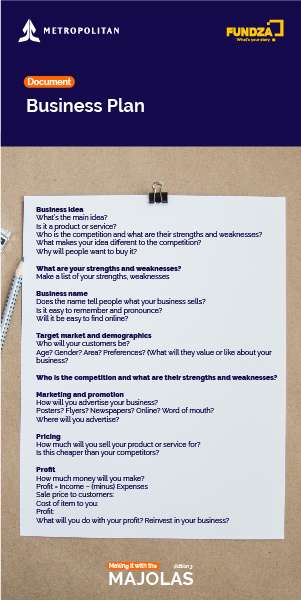Entrepreneurial skills
So, you want to be an entrepreneur — a person who sets up a business. This means that, like Nolwazi, you want to work for yourself. You already have some skills! Be prepared to be patient, work hard, and think of yourself as a problem-solver. It will cost you money, time and effort (labour).
There are different sorts of small businesses:
- Making things people want (clothes, artwork, jewellery)
- Doing things people need — providing a service (tutoring, translating, delivering, hairdressing)
- Growing things people need (vegetables, grains, herbs)
- Buying and selling (any products you don’t make yourself, like mobile phones)
Assess the needs and opportunities in your community
Start by asking yourself these questions. Later you will use your answers to write your business plan.
- What do people in my community need?
- What services or products do people want?
- How can I help them to fill that need (and get paid properly for my work)?
- Do I already have resources: skills/interests/contacts that will help me to be successful?
Look at your skills
Spend some time looking at the skills you already have. What have you got experience in, what are you good at? For example, you might be good at cooking or baking, which means you could start a business in this field, making food that is healthy, convenient and affordable. Or you might be good at looking after children and could start your own small childcare business for working parents.
Here are a few more ideas of areas you might be interested in, but there are many more ideas you can add to this list:
- caregiving for adults who can’t take care of themselves
- tutoring or running study groups for school or college subjects
- translating
- transport/delivery
- coaching sports or playing in local teams (soccer, gymnastics, dancing)
- youth entertainment (dancing, quizzes, movies, choirs)
- makeup/hairdressing
- laundry
- sneaker-cleaning
- sewing/tailoring
- electronics repairs
Think realistically and creatively
Entrepreneurs need to be realistic when it comes to their business ideas and think creatively about how they can make them successful.
There must be a demand (need or want) for your supply (product or service). There is a high demand for chickens and eggs in Nolwazi’s community. Through her contacts, she already knows that she would have customers, like Ma Stella’s creche. If there were too many chicken vendors where she lived, and she had no regular customers, her business would struggle. She would then have to find other ways to sell her product. Perhaps she could partner with a friend who does something different, like making chicken soup for hungry commuters.
Try to think of a unique or special angle on something that everyone already needs or uses. What can you do that makes your business different and stand out from the crowd?
Understand your market and customers
You have to understand your market and customers. It’s important to think creatively about what customers want, and how much they will pay for it. What do you wish was more available in your area? More English and maths tutors for the high school? Safety for pedestrians at night? It is useful if you make a list.
Now that you have identified the need, how can you do something about supplying it? Are you good at teaching? Could you organise a neighbourhood patrol?
Think about what you can actually do, and what you expect. Your goals have to be realistic and reachable.
Ask the experts, and then network
Nolwazi first has her idea for the chickens because she remembers her childhood experience helping her mother deliver chickens. Nolwazi realises that she already has some of the skills she needs: she knows quite a lot about chickens! She also has experience with handling cash and dealing with customers, from her work in the shebeen. But what she does need is help with the business side of things and luckily she knows people who can help her.
The Majolas and Ma Ruby will have more information about setting up a business because of their many years of experience.
It is important to find a trustworthy advisor like Ma Ruby, to discuss your business ideas, strategy, challenges, and progress with. People who have already done the sort of work you are interested in might be able to help by giving you advice or people to contact. You are building a network of people as well as building your business, so get one or two mentors on your side. As your business grows you might attract investors too. Nolwazi is lucky because Ma Ruby gave her a small loan to start her business.
Use your network! Communities are powerful. Get the word out that you’re looking for a certain kind of work to improve your skills. The more people who know, the more leads there will be for you to follow. Nolwazi is ready to move into chicken-farming, but if you are not ready to make a big move into a business, see if you can work for someone else who is already established in the field you are interested in and gain experience before you start your business. Lots of larger businesses (hospitals, schools, publishers) have interns — people who are paid much less (or not at all) while they are learning the trade. Learn all you can from other businesses before you start your own.
Make a Business Plan
It is important to be organised and plan properly for your business to ensure its success.
Write down everything you have to do as a record to make sure that you complete all your tasks. Keep a to-do list so you don’t lose track.
It is also a good idea to write up a basic plan. What will you sell? To whom? For how much? When? How?
A business plan is a summary of how your business will run, and has plans and budgets to show how you will make it successful.
Your business plan doesn’t need to be too detailed, but it is important because it shows that you have thought clearly about your business idea. This will help convince possible funders that it is worth investing in your business. If it looks too risky, they won’t invest or give you a loan.
Start with one page and include how much your business costs to operate, how much you think you will sell, who would buy your product, and why.
Make sure you do your basic sums carefully. If your business expenses are more than the money you will get in, then it’s not going to work and your business will make a loss!

Making a SWOT analysis
It is also useful to make a list of what your Strengths, Weaknesses, Opportunities and Threats are. This is called a SWOT analysis.
Strengths (Eg You have experience in handling cash, you are organised and reliable)
Weaknesses (Eg You don’t have much capital. Your time is limited as you have to work at another job as well)
Opportunities (Eg There are outlets in your area that would buy your product)
Threats (Eg Your stock isn’t insured and you haven’t got enough money to replace it if it is stolen or damaged)
Here are some reminders about the technical and business terms in this section.
Glossary
demand: the amount of goods and services that people want to buy — compared to supply
intern: a student or graduate gaining supervised practical experience (as in a hospital or classroom)
investor: a person that gives you capital (a large amount of money) because they expect future financial return (profit) or to gain an advantage (interest)
loan: money given to you that you pay back in the future (usually with added interest)
mentor: an experienced and trusted adviser
supply: the amount of goods and services that you have available for people to buy compared to demand
vendor: a person or company offering something for sale, especially a street trader



